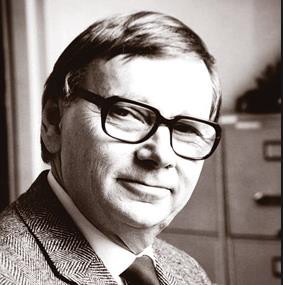
Lawrence F. Lowery
Professor Emeritus of Education
Lawrence Frank Lowery, Professor Emeritus of Education, passed away on December 15, 2016, following a short battle with pancreatic cancer. Lowery was an advocate for high quality education throughout his career; in the months before he passed away he was actively involved with the refinement of formal instructional materials, which have had major nationwide impact as described below, and also informal materials, such as a book on “mathemagical” card tricks. Larry’s personal mission was always to promote students’ engagement with, and enjoyment of, robust learning experiences in mathematics and science.
A Bay Area local, Lowery was born in Oakland, California, on June 26, 1932. He attended Oakland Technical High School, where he edited the school newspaper and had a regular column entitled “Here’s the Dope.” He also did cartoons for the paper, which may have been the reason he was invited to be a reviewer for the new Disney movie Cinderella. He graduated from Oakland Tech in 1950 and went to UC Berkeley as journalism major, graduating in 1954.
Working in education was clearly what Lowery was destined for. He began teaching in the Oakland Unified School District in 1957, and within a few years he was a “demonstration teacher.” He advanced quickly through the ranks, becoming an elementary school vice principal and then school principal. While serving as a teacher and administrator, Lowery was working on his Ed.D. at Berkeley. The degree was awarded in 1965, after which he joined the faculty of the Graduate School of Education at UC Berkeley as an assistant professor. He rose through the ranks, serving as associate dean of the school from 1980 to 1984.
Throughout his career as an educator, Lowery’s primary focus was on finding ways for students, teachers, and families to experience scientific and mathematical content in ways that were true to the disciplines and also developmentally appropriate. He was the founder of the Graduate School of Education’s teacher credential program, “Educational Research and its Applications,” which provided candidate teachers with a firm grounding in Piagetan theory. A dedicated and inspired teacher, he was awarded the Berkeley Division’s Distinguished Teaching Award for the 1974–75 year. He was a cofounder of the Bay Area Mathematics Project, which offered enrichment to local teachers. He was also an early equity and outreach advocate. Lowery recognized, early on, that students and families need to be welcomed into mathematics and science, especially if those disciplines were not typically part of their lives. Through the Lawrence Hall of Science at UC Berkeley, he was the principal investigator of two major outreach programs, EQUALS and FAMILY MATH. These programs widened access to mathematical and scientific content, by providing families with activities that were engaging and, at the same time, buttressed student learning. Reaching out to communities and welcoming them into the mathematical and scientific enterprise contributed to UC’s broader mission of equity and diversity.
Lowery was a prolific and powerful creator of instructional materials. Post-Sputnik, there had been a significant curricular revolution at the secondary level, with the creation of “hands on” materials that supported students in engaging with scientific ideas, rather than just reading about them. But, while science flowered at the secondary level, it was somewhat of a stepchild in K-8. The three R’s predominated, and what little science there was in classrooms was typically “hands off.” To address this challenge, Larry created the Full Option Science System (FOSS), whose purpose was “to engage students in science through active learning.” The idea, simply but profoundly, was to create a series of activities in which students in the elementary grades could conduct developmentally appropriate hands-on investigations, learning science by doing; they would learn to debate and discuss, to record their work (thus contributing to literacy development), and most importantly, to see science as a process of sense making. These materials, which were supported by grants from the National Science Foundation, had significant impact: they were used by more students and teachers than all the rest of the elementary school NSF-supported materials, combined. The FOSS materials earned honors from a variety of organizations, including the Association of American Publishers, the Technical Horizons in Education (THE) Journal Readers’ Choice Award, the Global Educator Institute, and the Association of Educational Publishers.
The FOSS awards represented only part of Lowery’s award portfolio. LearningMagazine gave Lowery its Outstanding Science Article award in 1981. Among the more notable awards, the California Council for the Education of Teachers credited Lowery with its Outstanding Teacher Training program in 1982; the California State Board of Education gave Professor Lowery a Certificate in Recognition of Contributions in 1984; the Association for the Education of Teachers in Science named him the Science Educator of the Year in 1989; and the National Science Teacher Association gave him the Distinguished Career in Science Award in 1993. Professor Lowery had a distinguished career indeed.
Alan Schoenfeld
2017
